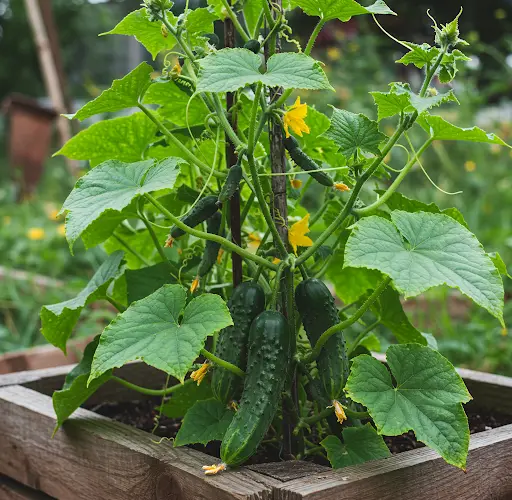The Ultimate Natural Fertilizer for Healthy, Fruitful Cucumbers
If you want your cucumbers to grow lush, healthy, and full of fruit, natural fertilization is one of the most important steps you can take. Many gardeners overlook this essential aspect of cucumber cultivation, resulting in weak plants that struggle with pests, diseases, and poor yields. Fortunately, there is a powerful and completely natural fertilizer that strengthens the entire plant, promotes robust growth, and helps prevent common issues—without the use of chemicals.
This article will guide you through why cucumbers need specialized care, the benefits of this natural fertilizer blend, and a simple recipe you can make at home.
Why Cucumbers Need Proper Fertilization
Cucumbers are fast-growing plants that produce fruit continuously during the growing season. This vigorous growth requires a consistent and balanced supply of nutrients. Without adequate nutrition, cucumbers often exhibit symptoms such as:
-
Pale, yellowing leaves
-
Stunted growth
-
Poor flowering
-
Low fruit yield
-
Increased vulnerability to diseases and pests
Regular and targeted fertilization not only supports strong vegetative growth but also boosts the plant’s ability to resist infections and pests while encouraging prolific fruiting.
Benefits of Natural Fertilization for Cucumbers
Using a natural fertilizer instead of chemical products offers several advantages:
-
Improved soil health: Natural ingredients feed the microorganisms in the soil, which in turn support plant roots.
-
Enhanced nutrient uptake: The right balance of organic compounds helps plants absorb nutrients more efficiently.
-
Disease resistance: Some natural components act as antifungal or antibacterial agents.
-
Sustainability: Organic fertilizers are environmentally friendly and safe for pollinators and pets.
-
Cost-effective: Most of the ingredients are easy to source from your kitchen or garden.
A Powerful Homemade Fertilizer Recipe for Cucumbers
This natural blend delivers essential macro and micronutrients that cucumbers need during their most active growing phase. It strengthens the plant from root to leaf, improves flowering, and increases the yield of healthy, tasty cucumbers.
Ingredients:
-
Nettles (1 handful): Nettles are high in nitrogen, which is vital for leafy growth. They help strengthen leaves and promote the overall vigor of the plant.
-
Wood ash (1 tablespoon): Contains potassium and phosphorus, which are essential for root development and fruit formation. It also helps improve the plant’s resistance to diseases.
-
Milk (100 ml): Acts as a natural antifungal treatment. It contains proteins and beneficial enzymes that protect leaves from fungal infections such as powdery mildew.
-
Honey (1 teaspoon): A natural growth stimulant that encourages the activity of beneficial soil microbes. It also supports flowering and improves pollination.
-
Water (1 liter): Serves as the base to dissolve and distribute the nutrients evenly.
How to Prepare and Apply the Fertilizer
-
Gather your ingredients. Make sure the nettles are fresh and the wood ash is completely cooled and dry.
-
Chop the nettles into smaller pieces to speed up nutrient release.
-
Combine all ingredients in a large container or bucket and stir thoroughly.
-
Let the mixture sit for at least two hours. This steeping time allows the nutrients to infuse into the water.
-
Strain the mixture if you want to use it in a spray bottle for foliar feeding.
Application Instructions:
-
Soil Feeding: Use the mixture to water your cucumber plants at the base, near the roots. Apply once a week during the growing season.
-
Foliar Feeding: For disease prevention, lightly spray the mixture onto the leaves every two weeks. Avoid applying during the hottest part of the day to prevent leaf burn.
Tips for Best Results
-
Apply in the early morning or late afternoon when the sun is not too strong.
-
Store any unused mixture in a cool, shaded place for up to 24 hours.
-
Always use fresh ingredients to ensure maximum nutrient content.
-
Avoid applying fertilizer to dry soil. Water your plants slightly before feeding to help them absorb the nutrients better.
Final Thoughts
Healthy cucumber plants don’t require chemical fertilizers. With the right natural ingredients, you can create a powerful organic supplement that nurtures your plants, protects them from pests and diseases, and boosts fruit production. This simple homemade recipe is not only effective but also environmentally friendly and sustainable.
Whether you’re a beginner or an experienced gardener, incorporating natural fertilization into your routine can make a noticeable difference in the health and productivity of your cucumber plants. Give this recipe a try, and enjoy an abundant harvest of fresh, green cucumbers all season long.



